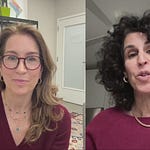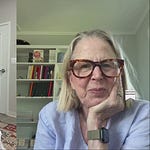You can also check out this episode on Spotify!
Screens have become a necessity of modern life. Whether we like it or not, they inform how we work, play, parent, and relate to other people.
Technology is a wonderful thing. But too much screen time can negatively affect our health. From sleeplessness and agitation to addiction and social isolation, our relationship with tech directly affects our body and mind.
On this episode, Dr. McBride expands on her concept of the Four “I”s. She discusses how to think about screens like we do other “inputs.” Whether it’s alcohol and sugar or Instagram and TikTok, the question isn’t just How much? It’s What is my relationship with the thing I’m consuming?
Maintaining digital hygiene takes work. A healthy relationship with technology requires the same self-awareness that we should apply to everything we feed our eyeballs and brains.
Join Dr. McBride every Monday for a new episode of Beyond the Prescription. You can subscribe on Apple Podcasts, Spotify, or at lucymcbride.com/podcast.
Get full access to her free weekly Are You Okay? newsletter at https://lucymcbride.substack.com/welcome
Please be sure to like, rate, review — and enjoy — the show!
The transcript of the episode is here!
Dr. Lucy McBride: Hello, and welcome to my home office. I'm Dr. Lucy McBride, and this is "Beyond the Prescription." Today, it's just you and me. Every other week this season, I'll talk to you like I do my patients, pulling the curtain back on what it means to be healthy, peeling back the layers of everyday medical problems I see. In clinical practice for over 20 years, I've found that patients generally want the same things, a framework to [00:00:30] evaluate their risks, access to the truth and the courage to face it, and tools and actionable information to be healthy mentally and physically. So whether it's managing weight, cholesterol, cancer, or mental health issues, we all want to feel more in control of our health. Here, I'll talk to you about how to be a little more okay tomorrow than you are today, and how to be healthy from the inside out. Let's go.
You may recall from a couple of weeks back, I spoke to you [00:01:00] about this concept of the Four I's. The Four I's is a visual representation of how I conceptualize health. Basically, as the integrated sum of different components, health is not just about our cholesterol or our blood pressure, it's about the intersection of our information, our inputs, our infrastructure, and our insight. Today we're gonna focus on inputs. One of the most important inputs into our ecosystem in addition to food, [00:01:30] water, and other substances, one of which is screen time. I don't need to tell you that our screens have become fastened to our persons, and that screen time has become more than just a passing fancy.
If you will, let's consider for a minute that the way we consume screens is not unlike the way we consume food. Put another way, we cannot survive without food, right? We have to eat to survive. We have to eat for focus, attention, and for our [00:02:00] basic survival, right? You cannot put food on a shelf and live without it. Similarly, in the modern era, it's pretty difficult not to use screens. It's pretty impossible not to look at television, a computer screen, or a smartphone during the course of your regular day. So you might fast for a religious experience, you might take a screen vacation for a weekend. But in general, we need food, we need screens to operate in the modern world.
So when I'm talking [00:02:30] to a patient about their health and we're talking about their sleep and their exercise and their nutrition, their medicines, their everyday habits, and how those things connect to their blood pressure and their vital signs and their laboratory results, I often ask people about their screen time, just like I ask people about their ingestion of sweets or carbohydrates, particularly if they have diabetes, and we're trying to kind of moderate their consumption. The way I think about screen time is again, like I think about food. It's something [00:03:00] we have to moderate, and therefore we have to think about not only how much we consume, but what is our relationship to it.
Okay, so let's talk about screens in more detail. Why do I care about screen time, to begin with? Well, because patients come in every day remarking or complaining about things like insomnia, stress, work-life balance, the challenges of caring for children, elderly parents, getting enough sleep, making time for exercise, doing the job of being human [00:03:30] in the modern world. And so, when I'm trying to help patients find more agency in their lives, carve out little bits of time to breathe, appreciate nature, take a rest, take a load off, if you really drill down into what people are doing with their time, there's a lot of screen time that patients would really like to consume less of, and that for their health would be better to moderate.
So I think the first thing about screen time is to think about how much we're on our screens. [00:04:00] Number two, what are we consuming? And number three, what are the emotions and thoughts that go into the usage? And what are the emotions and thoughts and behaviors, the result from being on screens more than you'd like? What do I mean? Two hours of screen time that is spent connecting with high school friends, doing grocery shopping, laughing at memes that provide brain rest relative to your hectic day is probably a total value add in your day-to-day life. But two [00:04:30] hours on screens where you're doom scrolling, avoiding an uncomfortable conversation with your spouse, staying up too late, and avoiding going to bed because you don't wanna get up and do it all over again, whatever your day might look like the next day, that is probably two hours that is a net drain on your psyche and a net drain on your body as well.
Just to give you a really clear example, I for one stay up way too late. That's my natural instinct is to stay up late and to sleep late. I'm just a night person, so I have to fight the instinct to be up late [00:05:00] on screens. I will convince myself that I am happier in giving myself a break by staying up late and looking at Instagram, looking at Twitter, scrolling around on various articles, and then I'll look at my clock and it's 12:30 a.m. or 1:00 a.m. and I'm really annoyed at myself, and I continue to be surprised at how annoyed I am with myself despite the knowledge of how much better I would feel if I had gone to bed an hour or two hours earlier and woken up with a fresh mind.
I'm not saying that screens are evil. I'm not saying that we don't [00:05:30] use them for pleasure and joy and connection with other people. I'm saying that we need to zoom out on how we are using screens and to be honest with ourselves about what they're doing and not doing for us, and to just insert consciousness into this inevitable input into our everyday lives. What we feed our eyeballs and our brains really matters in terms of how much time we're spending on screens. The opportunity costs of simply not going to bed at a decent time to then not wake up feeling refreshed or not going to the gym [00:06:00] to then guzzle down more coffee than you normally would, to then be more irritable during the daytime, to then eat more haphazardly. This is the mundane of being human.
Health, in my opinion, happens in these mundane moments where we have had too much coffee, we snap at our child and we wish we didn't, and we feel remorseful, and then we get into bed and go on our screens and do it all over again. So again, as I've talked about over and over, health is really about that insight into our everyday behaviors and our [00:06:30] awareness of how we do things that do not serve us. And then the ability to be honest with ourselves and to course correct as able. Am I going to go to bed tonight without my phone in my hand? Maybe, maybe not, but do I try to be more conscious about how I consume screens? I do, and I fail at it all the time because it's an occupational hazard of being human to want to numb out, zone out looking at images and things that people have written online.
But I wanted to say just like [00:07:00] we think about food as something we need to survive as something we enjoy, and that is a way to connect with other people, we also need to be aware of all of the inputs we put into our bodies. What are the feelings and thoughts that drive you to have a relationship with food that is more than simply about hunger and satiety? And then how do you feel when you've restricted calories during the day? How do you feel when you've not experienced satiety during the day? Similarly, how is your focus, your attention, and your energy when you've had a nice, [00:07:30] proper meal? Is your sleep better? Is your anxiety better? Is your focus better? Is your sense of calm, peace, and self-satisfaction better? And if the answer is yes, then the solution to irritability may not be quitting your job, it may be simply having lunch.
Similarly, when we're thinking about screen time, we wanna be conscious of the emotional inputs and outputs of the usage because as you and I both know, being on screens is the path of least resistance for human beings right now. [00:08:00] The other thing I'll say, this is just to state the obvious, but as a mother, it's hard not to notice that our kids are picking up on everything we do, whether we like it or not. And I'm not suggesting that our kids' flaws are a direct product of us and that we are to blame for all of their problems and that we are to credit for all of their successes. This is to say that our kids are watching us and how we relate to screens, they just are. They hear us say to them, "Honey, you really need to put your phone down. [00:08:30] It's time to get outside and play with your friends." Or "Sweetie, let's give the video games a break, time to go do your homework." They see us say that and then go and sit with a glass of wine and scroll through Instagram for a half an hour. They see that. It's not to say that we shouldn't do it, it's to say that we need to have an added level of consciousness in our homes about the things we say and the things we do and how they might not always match up. So I'm not saying that we should strive for perfection as parents, that is a tall order, and I'm not saying we shouldn't be on our screens. I'm saying that we should try to be honest [00:09:00] about how we model these behaviors at home.
And just like my patients who have daughters with anorexia, I try to remind them to make sure they're eating, that they're modeling healthy eating at home, and they're not restricting themselves. And it's not because I think the parents are to blame for someone's disordered eating, I think that the more we can do at home to model a healthy relationship with screens, the more we can sort of help our children understand that there's more to it than just screen time. It's really a relationship that we have.
So [00:09:30] as a final note, I think it's important to recognize that when we want to take something away from ourselves, or when your doctor wants to take away something from you, like sugar, or alcohol, or screen time because it's affecting your health or well-being in some way, I think it's important to recognize that when you take something away, it's really important to replace that with something else. Screens for an adolescent, for example, provide connection, or a sense of connection. They provide joy and pleasure. [00:10:00] They also provide some brain rest. So let's acknowledge that whether it's talking to your teen or talking to yourself about moderating screen time, you also need to think about what you're going to replace that feeling with. It's a lot easier to give something up if you add other things in. In other words, where there's pain, we also need to find pleasure.
So if you're gonna recommend to your child that they not have screens during the week, you might consider this may be a perfect time to get that rescue kitten or that rescue puppy, [00:10:30] sorry, mom and dad, if I'm ruining your family time by suggesting that. This may be the week or the month where you decide to have ice cream sundaes two days a week. In other words, it's not that you're bribing your kid, it's that you're simply being realistic about the human condition. That if we take away pleasure in one department, we need to insert pleasure in another department. Similarly, it's very hard for me to suggest to my diabetic patients, for example, that they cut back on sugar, they cut back on carbohydrates without suggesting to them, we find some other outlet for joy, [00:11:00] whether that's walking with a friend on the weekends or doing more online dating, or cultivating a book club, or making sure they go outside and enjoy nature more often.
It's very important to offset things we deprive ourselves of because we perhaps need to with things we can insert into our everyday joyfulness. I hope that you can think about screens for yourself because I, for one, struggle with that relationship. It's a necessity. It's a joy. [00:11:30] It's the way I connect with loved ones and friends. It's also an occupational hazard of being human to be consumed by them. I hope that's helpful. I will see you next time. Please leave me a comment, I'd love to hear from you.













